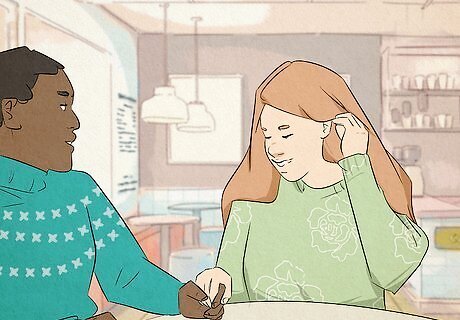
views
- ENFP will experience the strongest romantic connection with other Intuitive Feelers like INFJ, INFP, and ENFJ.
- ENFP can build a healthy, lasting relationship with Intuitive Thinkers like INTP, INTJ, ENTP, and ENTJ (though it may require some work).
- ENFP prioritizes commitment and creativity when looking for a soulmate. They’re also excellent communicators, though they struggle with criticism.
ENFP Soulmates

INFJ Both Intuitive Feelers, INFJ and ENFP complement each other beautifully. They have the same passion for humanity, creativity, and boundless curiosity yet their differences complement each other. ENFP’s extroversion can help INFJ break out of their inner shell and develop a more external sense of confidence. INFJs can use their inner compass and decisive judgment to help ENFP inquire deeply within, and inspire structure to help them build self-esteem internally and achieve their goals externally. To bond: be supportive of each other’s ideas, no matter how ambitious. As Intuitives, both types have boundless imagination and feel deeply. Receiving approval for their innovation goes a long way. Be careful with: planning and spontaneity. INFJ loves to plan while ENFP prefers to go with the flow. Try to find a happy medium by creating loose blueprints and schedules, but leaving room for flexibility.

INTJ ENFP will deeply appreciate INTJ’s calm collectedness and analytical mind while INTJ will find ENFP’s bubbly playfulness a refreshing change of pace. INTJ is a Thinker, not a Feeler so they can help teach ENFP not to take things personally while ENFP can remind INTJ (who’s reserved and logical) to let loose and have some fun once in a while. To bond: embrace theoretical ideas. INTJ’s mind is limitless, but their rational approach to the world makes them reign it in. ENFP is a deep thinker, too, so encouraging conversations about abstract subjects like metaphysics and philosophy will be stimulating. Be careful with: conflict resolution. As an Introvert, INTJ needs a lot of time to process every situation. ENFP thrives on harmony so this space may make them uncomfortable and cause them to lash out. Communicate your needs effectively so ENFP doesn’t misinterpret INTJ’s need for space as coldness and INTJ doesn’t find ENFP’s affection clingy.

INFP INFP and ENFP’s minds and hearts function very similarly. They’re both spontaneous, and thoughtful, and share a fundamental desire to be understood. An ENFP and INFP relationship will likely feel dreamy and romantic, even during rough patches. To bond: embrace vulnerability. ENFPs and INFPs both hate small talk. They prefer to get right into the emotional nitty gritty. Opening up about your hopes, plans, fears, and insecurities will help each type feel safe. Be careful with: criticism. Both types are Intuitive Feelers and neither have the self-discipline of the Judgement trait. Always be hyper-aware of your language when handling conflict and keep your feedback constructive.

ENFJ As Extroverts, Intuitive, and Feelers, ENFJ and ENFP both have a boundless well of empathy and desire to help others. This shared love of humanity and unwavering commitment to the greater good means these two types will constantly be striving to be the best versions of themselves, not just for each other, but to serve the people around them. To bond: volunteer together. Acts of service are a shared love language between ENFP and ENFJ as both feel motivated and inspired when they put others first. Help out at a soup kitchen, get involved in your community, or simply help a mutual friend who may be overwhelmed by a full schedule. Be careful with: practicing self-care. These types’ shared commitment to helping others makes it easy for them to forget to prioritize their own well-being. Remind each other regularly to eat right, get rest, drink water, and replenish your spirits with hobbies that make you happy.
Solid Matches for ENFP

ENFP Because they have such similar personalities, it’s easy for ENFP couples to get on the same wavelength. Their similar communication styles make it easy for them to work through disconnects and they likely have mutual interests, which allows them to bond over shared hobbies and activities. To bond: share your unconventional opinions and worldview. ENFP’s love people who challenge traditional norms (and even their own ways of thinking). Ignite this passion by expressing your unique style, hot takes, and crazy theories. The stranger, the better! Be careful with: individuality. Since both types are so similar, it can be easy for them to absorb each other’s personalities and lose their sense of self. Increase your self-awareness with activities like meditating (to clear your mind) and journaling to keep a healthy inner monologue.

INTP ENFP and INTP make a brilliant match (literally). Their shared intuition and spontaneity mean they love to learn new things and are constantly hungry for information. INTP will be charmed by ENFP’s social buoyancy and charisma while ENFP will be enthralled with INTP’s no-nonsense attitude and razor-sharp wit. To bond: learn something new together. Both types love deep conversation and intellectual pursuits. Listen to a podcast, watch a documentary, or take a date to the library. Then, discuss all the fascinating new concepts you discovered. Be careful with: remaining grounded. Since both types are intuitive and flighty, it can be easy for them to neglect the everyday practicalities of life. Stay on top of yourselves and each other by avoiding procrastination, and setting specific, achievable goals for each day.

ESFP These two personalities are the life of the party when they get together. Since both are Extroverts with a natural impulsiveness and love for making others happy, their popularity among their friends (and even strangers) is instinctive. These two make for a highly social, entertaining couple. To bond: go to a party or gathering together. Both personalities thrive in public and social situations and each will be impressed by the other’s natural talent for bonding with people and working a crowd. Be careful with: your social batteries. While ENFP and ESFP are both extroverted, their empathy means they can both easily absorb other people’s feelings. Remember to replenish by taking some quality alone time (just the two of you and individually) every now and then.

ENTJ ENTJ and ENFP are an extremely high-achieving duo. As Intuitives, both have a natural gift for seeing the big picture, and that shared vision makes it easy for these personalities to trust each other. ENFP will feel safe and motivated knowing ENTJ will fight to achieve their goals no matter what while ENTJ will appreciate ENFP’s energy and enthusiasm. To bond: take on a project together. ENTJ loves having something to strive towards and shows the most of themselves when they’re working. ENFP will love uncovering ENTJ’s new layers this way while ENTJ will love bringing out ENFP’s ambition. Be careful with: teamwork. ENTJ’s ambition can often lead them to a my-way-or-the-highway attitude. ENFP must overcome their desire to please and stand their ground to remind ENTJ this is a mutual partnership while ENTJ must learn to compromise and make decisions as a team.

ESFJ ESFJ can fulfill ENFP’s need for love and validation better than arguably any other type. As an extroverted Feeler, unconditional encouragement comes naturally to ESFJ and, as a Judger, they have the self-discipline to maintain that support. Meanwhile, ENFP’s unique worldview can ignite a passion in ESFJ that, as a more rational Sensor, they never knew they had. To bond: validate each other’s feelings. Both these personalities prioritize emotional companionship, so listening actively and affirming each other’s values will help both types feel comfortable around each other. Be careful with: objectivity. Since both these types draw so much energy from others, they may end up focusing too much on the humanity of every situation instead of the cold hard facts. Maintain your sociability and optimism but remind each other to be more realistic and impartial.

ISFP Equally empathetic and flexible, ENFP and ISFP can have a fulfilling romance with the right amount of work. ISFP is a Sensor meaning they’re not as interested in the theoretical; this approach can help ENFP get their head out of the clouds and be more present. Meanwhile, ENFP’s extroversion and optimism can help ISFP look at the world in a more hopeful light (which they sometimes struggle with). To bond: go somewhere in nature. Both these personalities recognize that there’s a lot of beauty in the world. Taking some time to breathe and patiently recognize this beauty can help both types get more in touch with their emotions, which they’ll appreciate as Feelers. Be careful with: communicating your ideas. As a Sensor-Intuitive pair, ISFP and ENFP don’t see the world the same way. This isn’t necessarily a bad thing, as they can teach each other new things. However, when communicating, ISFP must remember to zoom out and focus on the big picture while ENFP needs to zoom in and keep their thoughts logical and realistic.

ENTP ENFP and ENTP make for a powerful and innovative duo. Both personality types are experimental and feisty, and share a love for humanity as a whole. Plus, their one shared difference (Thinking vs Feeling) can help them bring out the best in each other. ENTP can help ENFP see through their biases and look at things objectively, while ENFP can teach ENTP to get in touch with their own feelings and embrace humanity on an individual level. To bond: start a debate about philosophy. ENFP and ENTP love long, shifting conversations about complex subjects that can shift on a dime. Sparring with each other (as long as it’s civil) will have both personality types walking away feeling stimulated (and maybe even titillated). Be careful with: criticism. ENTP is experimental and doesn’t prioritize feelings in the same way as ENFP. Therefore, they may voice harsh opinions just to see what will happen. Meanwhile, ENFP’s need for support may get exhausting to ENTP. If ENTP can reign in their contrarian ways and ENFP can avoid taking things personally, these two make a great match.

ESTP ENFP loves learning new approaches to life and ESTP can teach them just that. As Extroverts and Perceivers both have a ton of energy and a love of adventure. Plus, their opposing approaches to life (ENFP focusing on all the possibilities and ESTP focusing on the here-and-now) offer them the chance to learn something new. To bond: travel somewhere. Both personalities love to explore the world and hate being kept in one place for too long. Experiencing something new in an exotic location will forge a friendship between ENFP and ESTP quickly. Be careful with: structure. Neither of these personalities loves to plan, which can leave them unprepared in critical situations. Stay on top of each other and remember to create schedules before leaping into your next big thrill.
Challenging Matches for ENFP

ISTJ ENFP and ISTJ are polar opposites. While opposites can attract, these two may have a tough time bonding due to their conflicting interests. ISTJ loves to plan and tends to focus on the day-to-day while ENFP is more spontaneous and loves to dream big. How to make it work: ENFP can help ISTJ dream big while ISTJ can show ENFP the beauty in everyday routine.

ISFJ As Feeler-Judgers, ISFJs are self-critical and great with compromise. They’re more than willing to adapt their personalities to connect with someone better. However, to the highly authentic ENFP, this may come across as fake, like they’re denying true happiness just to fit in. Meanwhile, ISFJ may find ENFP’s individualism to be too self-serving to build a long-term partnership. How to make it work: ENFP can use their people skills and intuition to show ISFJ to stay true to themselves without alienating people and ISFJ can use their group-oriented work ethic to remind ENFP of their love of community.

ESTJ ESTJ and ENFP both have strong personalities and may struggle to see eye-to-eye. ESTJ is very focused on structure and external accomplishments while ENFP prioritizes emotional achievements over material goods and thrives when things are fluid. How to make it work: ENFP can teach ESTJ to use their intuitive mind as much as their analytical mind, while ESTJ can help ENFP stay organized so they’re free to practice their creativity in a less-chaotic environment.

ISTP ISTP may be easily overwhelmed by ENFP’s energy, imagination, and sociability. As Introvert-Sensors, ISTPs tend to like having a straightforward routine. They may feel triggered by ENFP’s ever-changing ideas. Meanwhile, ENFP may find ISTP’s simplicity to be boring and their lack of emotional priority to be blunt and harsh. How to make it work: ENFP can help ISTP become more in touch with their emotions which can make their alone time more enriching. Meanwhile, ISTP can help ENFP become more introspective which will sharpen their creativity and intellect.
ENFP in Love

ENFP is energized and emotionally engaged with the right partner. While more introverted personality types may need alone time to replenish, ENFPs find their partner’s presence to be extremely nourishing. When they like someone, they rarely get bored or tired around them, and their Intuitive-Feeler mind makes them hyper-aware of their partner’s mental and emotional needs. Being in a long-term relationship with an ENFP can often feel like telepathy. Once they’ve spent enough time with someone they love, they can naturally pick up on their needs without a word being said.

ENFP wants a relationship to feel like an adventure. Their Perceiver trait makes them naturally spontaneous, and they look for partners who are equally bold and enthusiastic. They find predictability and routine tedious so they want each day to feel new, exciting, and fresh. ENFPs are deep thinkers so an adventure for them is often intellectual or emotional. Introducing them to new ideas, showing them a new film, or playing them a new song is often more than enough stimulation for them.

ENFP won’t try to change their partner, but they expect the same acceptance. ENFP loves unconditionally. While their intuition allows them to see boundless potential, when they fall for someone, they accept them as they are. However, they expect this same unwavering commitment. ENFP needs to feel unabashedly supported above all else. If they feel misunderstood, it can violate their faith in the relationship. The best way to love unconditionally is to ask yourself “What is the most loving way I can behave in this moment?” Then, act accordingly.

ENFP is warm and selfless in the bedroom. ENFPs are deep feelers and their extroversion means they don’t like to hide anything. They don’t offer physical intimacy to someone they don’t like and trust. However, once ENFP knows their partner is fully invested, there isn’t anything they wouldn’t do for them. Plus, they’re naturally giving and sensual lovers by nature. While emotions will always play a part in sex for ENFP, they’re also naturally playful. They’re more than willing to let loose and experiment, as long as they feel supported by their partner.

ENFP falls in love hard and fast. Their natural optimism makes them see the best in people, so they often trust their feelings whenever they like someone (for good and for bad). The good news: this means they’re unphased by the natural hiccups and miscommunications of a relationship. They know their devotion and partner are enough to overcome these minor issues. However, they may sometimes move too hard, too fast when it comes to relationships. The hardest time in a relationship for ENFP is right after the honeymoon stage ends. If you can remind them that it’s okay for the initial passion to die down and that you can still find new ways to serve and delight each other, you have a promising romantic future ahead.
ENFP Flirting & Communication

ENFP is an excellent communicator in relationships. As an Intuitive-Feeler, ENFP is capable of empathizing deeply and can consider perspectives from all angles. This makes them great at voicing their emotional needs and expectations, as well as resolving conflict. In addition, their priority of unconditional support often makes the way they communicate empowering. Their excellent communication skills also make them extremely fun to flirt with since they can easily pick up cues and make others feel attractive/inspired.

ENFP is bold and courageous in their flirtation style. Because of their natural charm and charisma, they know how to play it smoothly. However, don’t expect any coyness when wooing an ENFP. If they like you, they’ll tell you exactly what they like about you with all the passion and warmth they can offer. They might even make plans with you or ask you to join them on their next adventure (regardless of how intense the excursion is or how long you’ve known each other). ENFP also doesn’t like playing games. While they love the mental stimulation of flirting, once they commit to somebody, they prefer and expect straightforward communication.
Challenges of Dating an ENFP

ENFP gets bored easily. While their Perceiver trait provides a wonderful sense of spontaneity, ENFP often loses interest if they feel like something is too conventional or lacks long-term meaning. This can make the necessary day-to-day communication of a relationship (what to make for dinner, weekend plans, etc.) feel unnecessarily difficult. An easy way to add some excitement to your relationship is to find new ways to make decisions. For example, if they ask what you want for dinner, instead of responding “whatever you want,” try drawing restaurants from a hat.

ENFP doesn’t handle criticism very well. As an Intuitive-Feeler, ENFP is quite sensitive. While this makes them compassionate, they also tend to get defensive whenever they’re given feedback they don’t like, which can dampen their (usually excellent) conflict-resolution skills and make communication difficult. When voicing criticism to an ENFP, try to structure your statement “I feel ___ when you ___”. Doing so makes the criticism feel less harsh, since it’s focused on your emotions and their behavior, rather than their personality. For example, instead of saying “Stop leaving the dishes in the sink! You’re so messy!” you might try “I feel frustrated when you leave your dishes in the sink.”

ENFP can be unrealistic. The sky’s the limit for ENFP’s ideas and while their limitless imagination often encourages inspiration, it can be tough to get them to see the rational side of things. Sometimes, they may be so focused on all the possibilities, they may forget how to handle the tasks that are directly in front of them. Help ENFP set realistic goals by encouraging them to outline each step in what they want to achieve. It can help to start with the dream and work backward. For example, if they want to be President, they need to get elected. To get elected, they’ll need to build up credibility in the political field. To do that, they need to work in politics. To work in politics, they need expertise. To gain expertise, they may want to take some political science classes, and so on.
ENFP Relationship Strengths

ENFP wants to please their partner more than anything. As a Feeler, ENFP prioritizes harmony in their relationships and when they fall for someone, they’ll stop at nothing to make sure their emotional needs are met.

ENFP is loyal and committed. While ENFP is quick to fall in love, once they’re in, they’re in for the long haul. ENFP will never turn their back on their partner and will come to their loved ones’ defense no matter what.

ENFP can find joy in anything. ENFP has a wonderful sense of humor and natural optimism. This means they can easily make difficult, tense, or tedious situations feel fun and playful. Their glass-half-full attitude is even infectious and they can help their partners see life more brightly in the long term.




















Comments
0 comment